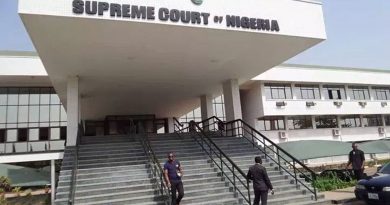On Making Sure Your Votes Are Valid
This race is on its final lap.
It’s been months of campaigning, filled with rhetoric, gaffes, debates and of course, inspiration for our vibrant content creators. After what will go down as one of the most engaging, interesting, and drama-filled campaigning seasons this country has witnessed, we now head to the polls.
The long-anticipated seventh general election, since Nigeria’s uninterrupted democratic governance, is finally upon us.
On February 25th and March 11th, 2023, Nigerians will have another once-in-four-year shot at electing their President, Vice President, members of the National Assembly (Senate and House of Representatives), Governors, Deputy Governors, and members of their state houses of assemblies.
I am most excited at the increased interest among young Nigerians toward exercising their civic responsibility — voting. It doesn’t matter if you are Obidient, Atikulate, or Batified, voting is an individual activity that benefits society as a whole and I am proud of you. If nothing else, I hope that the outcome of the upcoming general election will show that Nigerians are rising above one of the major challenges to Nigeria’s democracy — voters’ apathy.
Being a young person myself and having interacted with young persons, I know how our passion can make us act in ways that seem to overlook processes, procedures, and protocols because we expect that an election should be as simple as sending the name of your preferred candidate via SMS. However, we do not live in a world where things are ever that straightforward (at least not yet).
There are laws and rules guiding elections in every democratic country and Nigeria is no exception. The possibility of your candidate emerging as the winner in the elections will depend not only on their conduct and ability to persuade you to vote for them but on your readiness to cast a ‘valid vote’ for them.
This post will serve as a guide for you and me to ensure our votes are valid and that they count.
Who is eligible to vote?
A Nigerian citizen registered as a voter whose name appears in the ‘Registers of Voters’ and can present a valid permanent voter’s card (PVC) at his or her polling unit is eligible to vote.
If you do not have your PVC, you are not eligible to vote.
Where to vote?
Voting takes place at a ‘Polling Unit’ and ‘Voting Points’. A polling unit is a fixed centre for individuals to exercise their electoral rights while a voting point is created from polling units based on multiples of 500 and a maximum of 750 registered voters or as may be determined by INEC.
In the case of FCT, voting occurs at a polling unit, voting points, and voting point settlements which are created at a newly developed location or settlement which is too far from the closest polling unit. It is still treated as a polling unit.
How to find (locate and confirm) your polling unit:
- Kindly text the name of your State, Lastname and the last 6 digits of your Voter Identification Number (VIN) to 09062830860 or 09062830861 to get your Polling unit name. Example: FCT MAGAJI 445322
- You can get it on the INEC Website — Visit www.voters.inecnigeria.org or www.cvr.inecnigeria.org/vvs to get your Polling unit name.
Please note that no person shall be allowed to vote at any polling unit other than the one at which his or her name appears in the Register of voters.
Voting time:
On election day, accreditation and voting are expected to commence at 8:30 AM and close at 2:30 PM or as may be determined by the commission, provided that all voters already on the queue by 2:30PM shall be accredited and allowed to vote.
If your goal is for your vote to count, please endeavour to be at your polling unit at 8:30 AM. There is no room for procrastination. Arriving late to the polling unit will only increase your chances of not being able to vote.
Accreditation and voting process:
One of the major amendments of the Electoral Act of 2022 is allowing for the use of electronic devices in the accreditation process and general conduct of the election.
This is made possible by the introduction of the Bimodal Voter Accreditation System (BVAS), replacing the card reader, which is expected to improve the transparency of election results.
Unlike card readers which were configured to only read permanent voters’ cards at the point of accreditation, BVAS cannot only read PVCs, but can verify card-carrying voters through their fingerprints or facial recognition. This is expected to eliminate the falsification of total number of accredited voters among other common problems in Nigeria’s election result management process.
Anyone who votes without accreditation will be recorded as overvoting (analysts have opined that this could have been the case in the Osun election following the verdict of the election tribunal).
Unlike elections before the Electoral act of 2022, there is no time frame for accreditation since accreditation and voting are now expected to run simultaneously.
The right voting finger
A while back, I was privy to a step-by-step training material on voter education, and it was advised that voters use their index fingers while voting.
In a report published in 2019, an INEC representative debunked multiple reports stating that the index finger is the only valid finger for voting because all fingers were captured at the point of registration. The representative added that any finger can be used as long as it does not spill ink beyond the box meant for a party.
I will say, use the finger you are most comfortable with and ensure it does not spill. Personally, even when having to register a finger for electronic door access, I prefer my index finger.
Method of voting:
Open Secret Ballot System — Voting in the 2023 General Elections shall be by ‘Open Secret Ballot System’ where voters thumbprint on the ballot for candidates in secret and cast their votes in the open. This means that you cannot show another person your ballot paper after thumb-printing on it. You cannot take a picture of the ballot paper and share it on social media.
Please note:
Presiding officers and returning officers have the right to bar anyone from entering a polling unit and collation centre if they are disturbing the peace of the election.
The air is typically always heavy with doom prior to elections in our country. But we are a maturing democracy, and in the last couple of elections, we have largely shown that maturity at the polls. It is my hope and prayer that we show that maturity on February 25th and March 11th, 2023.
God bless the Federal Republic of Nigeria!




